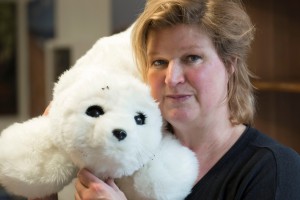A robotic baby seal is bringing love and affection into the confused and often frustrated lives of dementia patients.
 “Paro” has been purchased by the University of Brighton to test its effects on patients and so far the seal pup is proving beneficial, and not just to patients: Families are seeing smiles and happiness in the faces of their loved ones, a source of great relief for many.
“Paro” has been purchased by the University of Brighton to test its effects on patients and so far the seal pup is proving beneficial, and not just to patients: Families are seeing smiles and happiness in the faces of their loved ones, a source of great relief for many.
The research is being conducted by Dr Penny Dodds, Nurse Lecturer Practitioner with the University of Brighton’s School of Health Sciences. She is also employed by the Sussex Partnership NHS Foundation Trust whose therapists and nurses are using Paro on dementia wards in Worthing.
The experiment is scheduled to be featured in an episode of the BBC Radio 4 consumer affairs programme You and Yours on 16 February.
Dr Dodds, Paro under her arm, walked round the Burrowes dementia unit in Worthing with Radio 4 reporter Vernon Harwood, and the reaction from some patients was instant: One elderly woman’s face lit up on seeing Paro. She smiled, reached out, stroked him and kissed his nose.
Paro costs £4,000 and has built-in sensors to react to sound and touch. The artificial intelligence allows it to “learn” and respond to names patients give it – Clarence and Snowball are two favourites. It reacts to being stroked and spoken to. It wriggles, turns to the patient, opens its big eyes and lets out a cute, appealing squeak. Even ward staff find Paro difficult to resist and often stroke him as they pass by.
Its Japanese creater, Takanori Shibata, selected a harp seal because of its benign looks and he designed it to make it obvious even to vulnerable people that Paro is not real but made from synthetic fur and circuits – there are audible robotic noises when it moves its head or flippers.
Research into Paro’s usefulness is continuing and Dr Dodds said she may yet find a more effective and cheaper reactive cuddly toy but so far she believes Paro is value for money. She said: “It is similar to pet therapy but with real animals and pets there is a hygiene issue and a remote risk of the animal biting or chasing. Paro always behaves, has rechargeable batteries, is always available, and will last about 12 years.
“The most important aspect is the difference Paro makes to a patient’s quality of life. We have seen Paro helping relax a patient when they have become upset and distressed. Maintaining calmness makes life more pleasant for the patient and for staff, and it can avoid the need to use medication, so there is also a financial saving.”
Sally Stapleton, Clinical Psychologist, who works on Burrowes Unit, said, “We are taking the time to get this right – asking patients and their families how they feel as well as training staff fully in its use. Some people may choose not to interact with Paro but others have been fascinated and it has sparked some interesting conversations.”
Dementia affects some 800,000 people in the UK and the numbers are climbing every year. Dr Dodds, whose father died recently after suffering from the disease, said: “I’m very impressed with Paro so far – anything that has a positive psychological effect and makes patients feel comforted and less distressed has to be worth it.”









